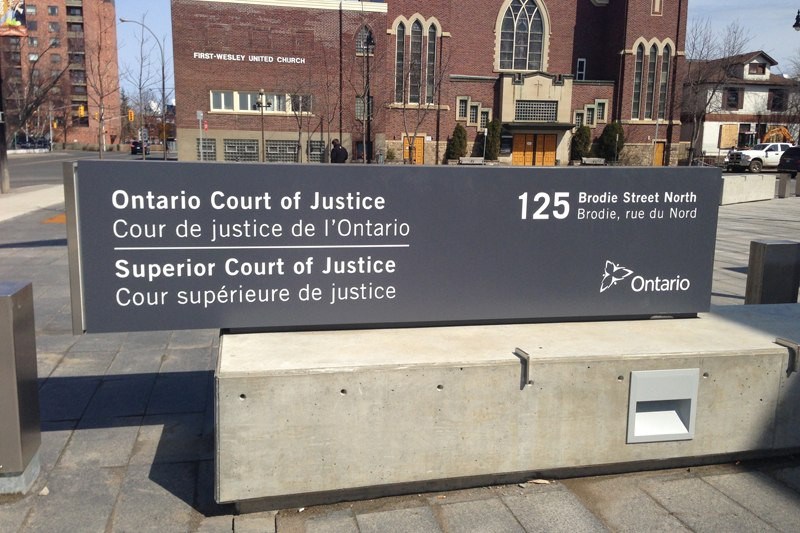THUNDER BAY – A youth who pleaded guilty to manslaughter in the beating death of 18-year-old Liam Slipperjack will not be sentenced as an adult.
Justice Tracey Nieckarz dismissed an application brought forward by the Crown asking for the youth to be sentenced as an adult.
In January 2024, the youth, who was 17-years-old at the time of the offence and cannot be named in accordance with the Youth Criminal Justice Act, and 22-year-old Desomond Keewaykapow, pleaded guilty to manslaughter in connection to Slipperjack’s death.
Both the youth and Keewaykapow were initially charged with second-degree murder following Slipperjack’s death in April 2021.
Police located Slipperjack in the Limbrick Street area in the early morning hours of April 30, 2021 with severe injuries to his face and head.
The investigation uncovered video surveillance footage from the area that showed Slipperjack being pursued and tackled by Keewaykapow.
Keewaykapow and the youth then proceeded to punch, kick, and knee Slipperjack in the face and head for several minutes. According to an agreed statement of facts, the three had been friends but an argument between Slipperjack and Keewaykapow escalated into the physical confrontation.
Slipperjack was transported to the Thunder Bay Regional Health Sciences Centre where he received surgery to relieve swelling around his brain. He did not regain consciousness and died as a result of the injuries he sustained.
Following Keewaykapow’s guilty plea to the lesser charge of manslaughter, he was sentenced to 5.5 years in custody to be followed by 24 months of probation.
Victim impact statements made during Keewaykapow’s sentencing said Slipperjack’s death has left a profound and enduring impact on his family.
“Their pain is made that much worse by the fact that his death came at the hands of his friends,” Nieckarz said. “I have no doubt that there are many more family members and friends of Liam who continue to suffer from the enormous loss of this young man and the tragic way in which he lost his life.”
The Crown’s application argued that due to the gravity of the offence, the youth’s proximity to the age of 18 at the time the offence was committed, and his past criminal record that included incidents of robbery and escalating violence, only an adult sentence would adequately address the harm caused.
Defence counsel disagreed, arguing the Crown failed to demonstrate the youth is not entitled to the principle of diminished moral blameworthiness afforded under the Youth Criminal Justice Act and that rehabilitation and reintegration should be the primary considerations in the youth’s sentencing.
Nieckarz agreed with the defence, saying the youth has experienced significant trauma in his short life, but has shown positive signs of rehabilitation while in custody.
“I am not satisfied that an adult sentence is required to sufficiently hold [the youth] accountable for the manslaughter committed against Mr. Slipperjack,” Nieckarz said in her decision released last week.
“I find that had [the youth] been an adult, or had I decided to sentence him as such, I would not have sentenced him to 7 years. In my view, while that sentence does appropriately account for the aggravating factors in this case, it does not properly account for [the youth] being a youthful Indigenous offender, the significant Gladue factors present in this case, the sentence received by [the youth’s] co-accused, and the principles of restraint and rehabilitation.”
According to Nieckarz, if the youth was sentenced as an adult it would have been in parity to Keewaykapow’s sentence of 5.5 years. With credit for enhanced pre-sentence custody, the youth would have been left with approximately six more months to serve.
“I cannot conclude that an extra 6 months (which may or may not be eligible for parole release) is more appropriate to hold [the youth] accountable for his crime,” Nieckarz said.
Under the Youth Criminal Justice Act, the maximum sentence of a young person convicted of manslaughter is three years. If given credit for pre-sentence custody, the youth has already exceeded the maximum sentence, having spent three years and 125 days at a youth facility since the time of his arrest.
Nieckarz went on to say that the youth has done well while in custody and has been working toward addressing his trauma and substance abuse issues, while also expressing an interest in continuing his education, getting a job, and potentially returning to his home community.
“I agree with defence counsel and the report writers that a culturally appropriate plan must be in place before [the youth’s] release to best ensure his continued progress in dealing with his trauma, to ensure no further involvement with the criminal justice system, and most importantly to ensure that he never again finds himself in a situation in which someone is either seriously injured or dies by his hand,” Nieckarz said.
The sentencing of the youth has been delayed to ensure an appropriate plan is in place upon his release. Further submissions from counsel will also be heard before the court imposes a youth sentence.
